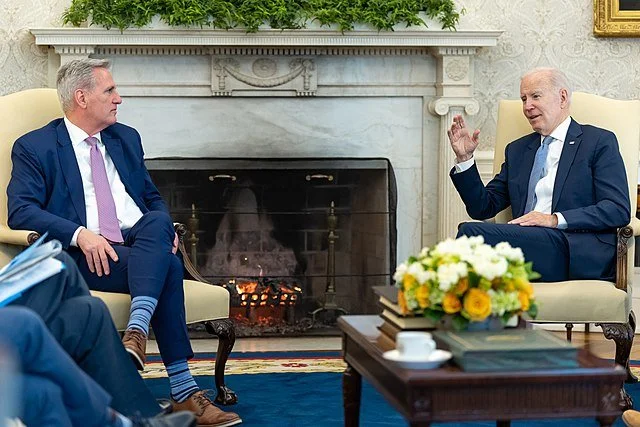The impending US debt crisis
President Biden and Speaker of the House Kevin McCarthy during a meeting to discuss the debt ceiling
Photo courtesy of the White House
On January 19th, U.S. Treasury Secretary Janet Yellen informed congressional leadership that the government had reached its self-imposed borrowing limit of $31.381 trillion. She noted in her letter that the Treasury would use “extraordinary measures” to continue to fund the normal operations of the federal government, but that those resources would likely only last until June.
Yellen’s letter marks the beginning of the newest round of debt ceiling negotiations, a phenomena in American politics in which legislators negotiate the conditions on which they would agree to raise the debt ceiling and avoid a default on public debt. The first debt ceiling crisis in recent history came in 2011, when Republicans in the House of Representatives, fresh off an overwhelming victory in the 2010 midterm elections, demanded a deficit reduction in exchange for increasing the debt ceiling. Prior to that, the borrowing limit had been routinely increased to meet the needs of federal spending without partisan debate or negotiation.
The conflict was resolved after President Obama and congressional Democrats conceded roughly $90 billion in annual spending cuts. As a result of the crisis, U.S. government debt was downgraded for the first time in history and equity markets across the globe experienced massive sell-offs.
When the debt ceiling was again hit in 2013, House Republicans asked for even more spending cuts. This time, Obama ignored their requests and Republican lawmakers agreed to raise the limit anyway and keep the government funded until 2017 without having any of their demands met. Democratic control of congress and initial bipartisan support for funding a national response to the pandemic meant a reprieve from the last few years of debt-ceiling negotiations.
Between now and June
Lawmakers must come to an agreement to increase the debt ceiling before the Treasury exhausts the extraordinary measures it's taking to pay the government's bills.
House Republicans have already made it clear that they will make demands in exchange for passing an increase in the debt ceiling. After receiving Yellen’s letter, Speaker of the House Kevin McCarthy told reporters “Let's find common ground and let’s eliminate the wasteful spending to protect the hardworking taxpayers to protect the future of America”. We have yet to hear any specifics on what counts as “wasteful spending” to McCarthy, and other members of his party have made it clear the $817 billion allocated to the Pentagon and arms manufacturing companies cannot be touched.
Asked whether President Biden would be open to negotiations, White House press secretary Karine Jean-Pierre said: “Congress has always done it, and the president expects them to do their duty once again. That is not negotiable.”
Raising the debt ceiling would require legislation to be passed by both the House and the Senate before being signed into law by President Biden. In the Senate, Democrats can only afford one of their members to support the Republican’s attempts to negotiate. Conservative Senators who caucus with the Democrats Joe Manchin and Krysten Sinema are considered by many to be the most likely to defect, with Manchin having already voiced his support for a negotiation.

